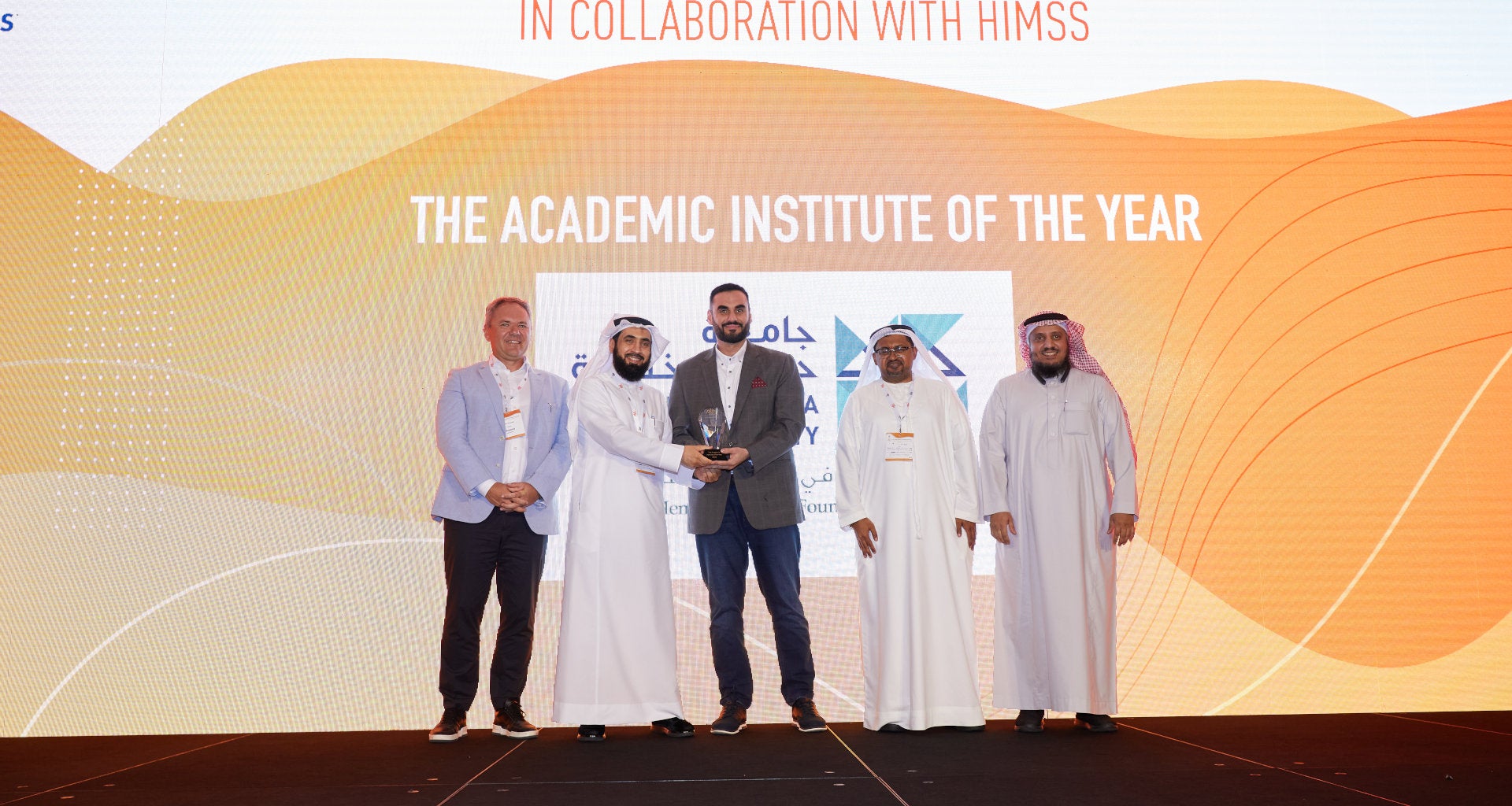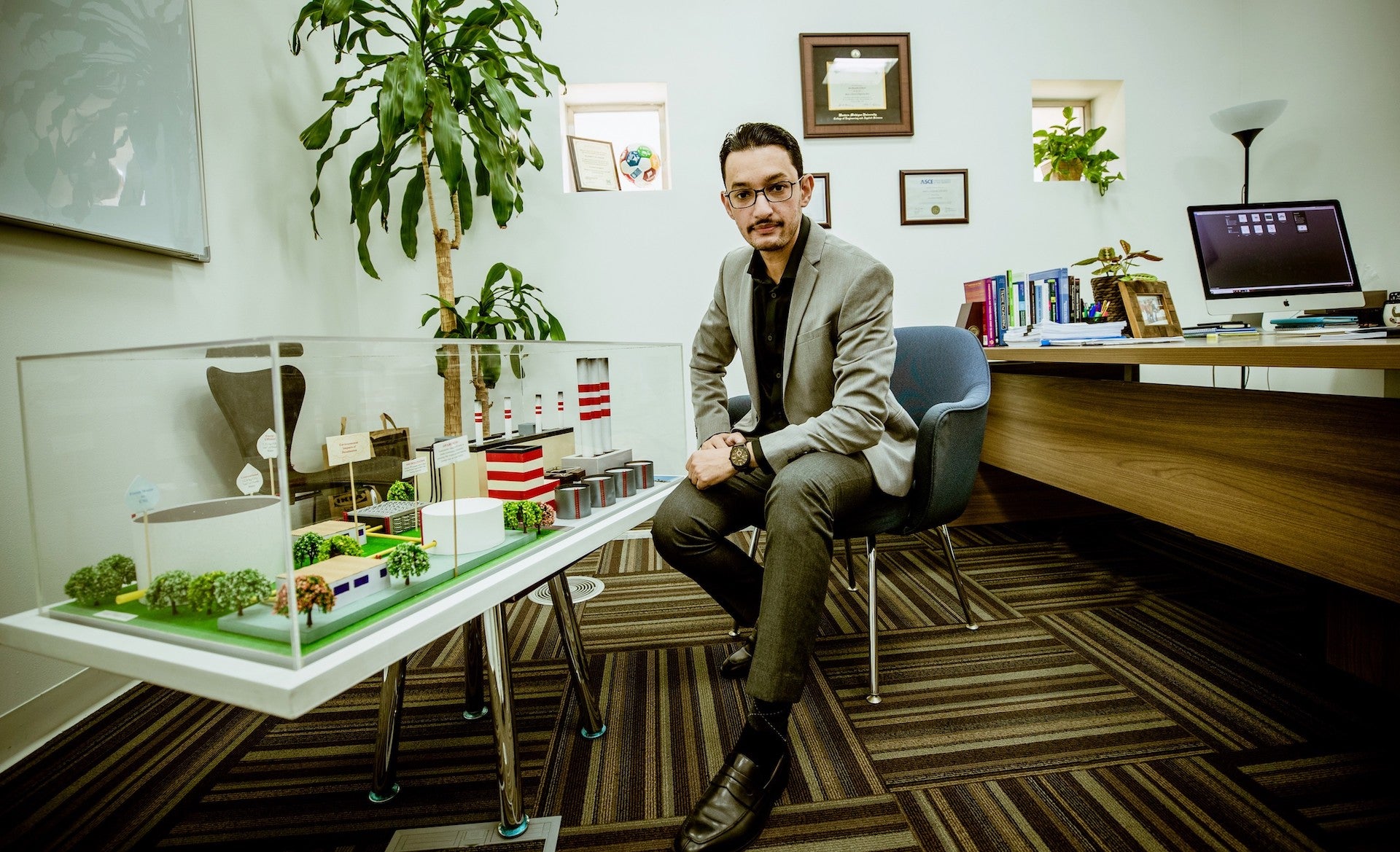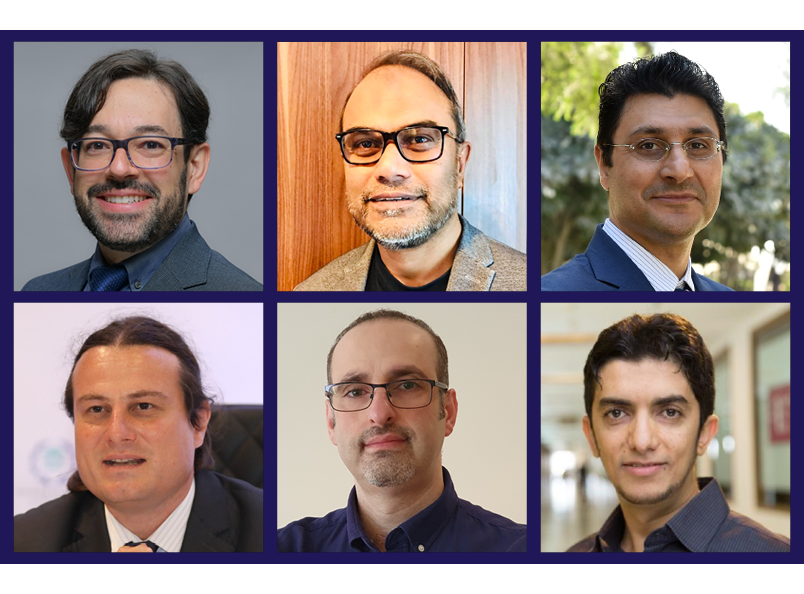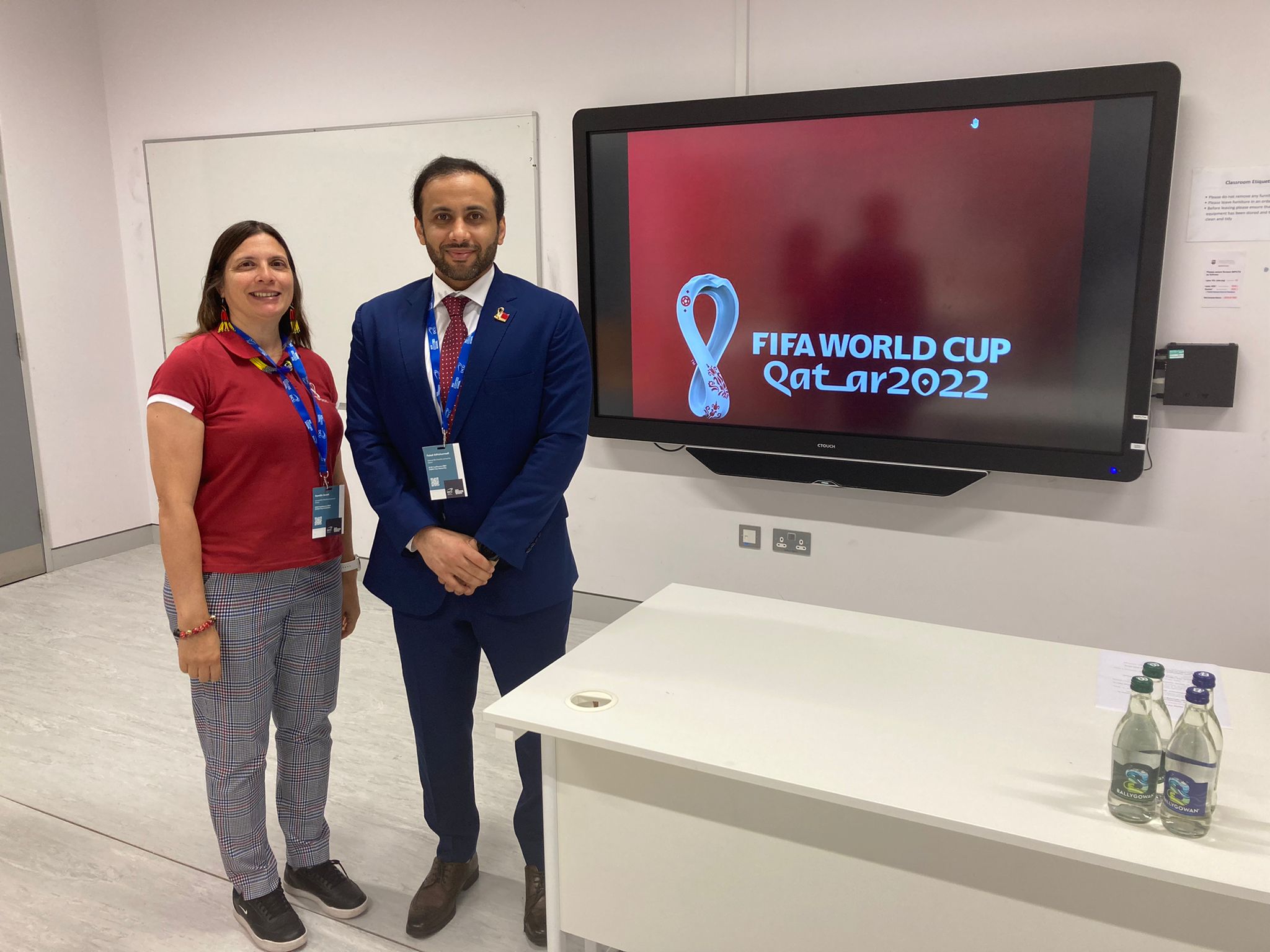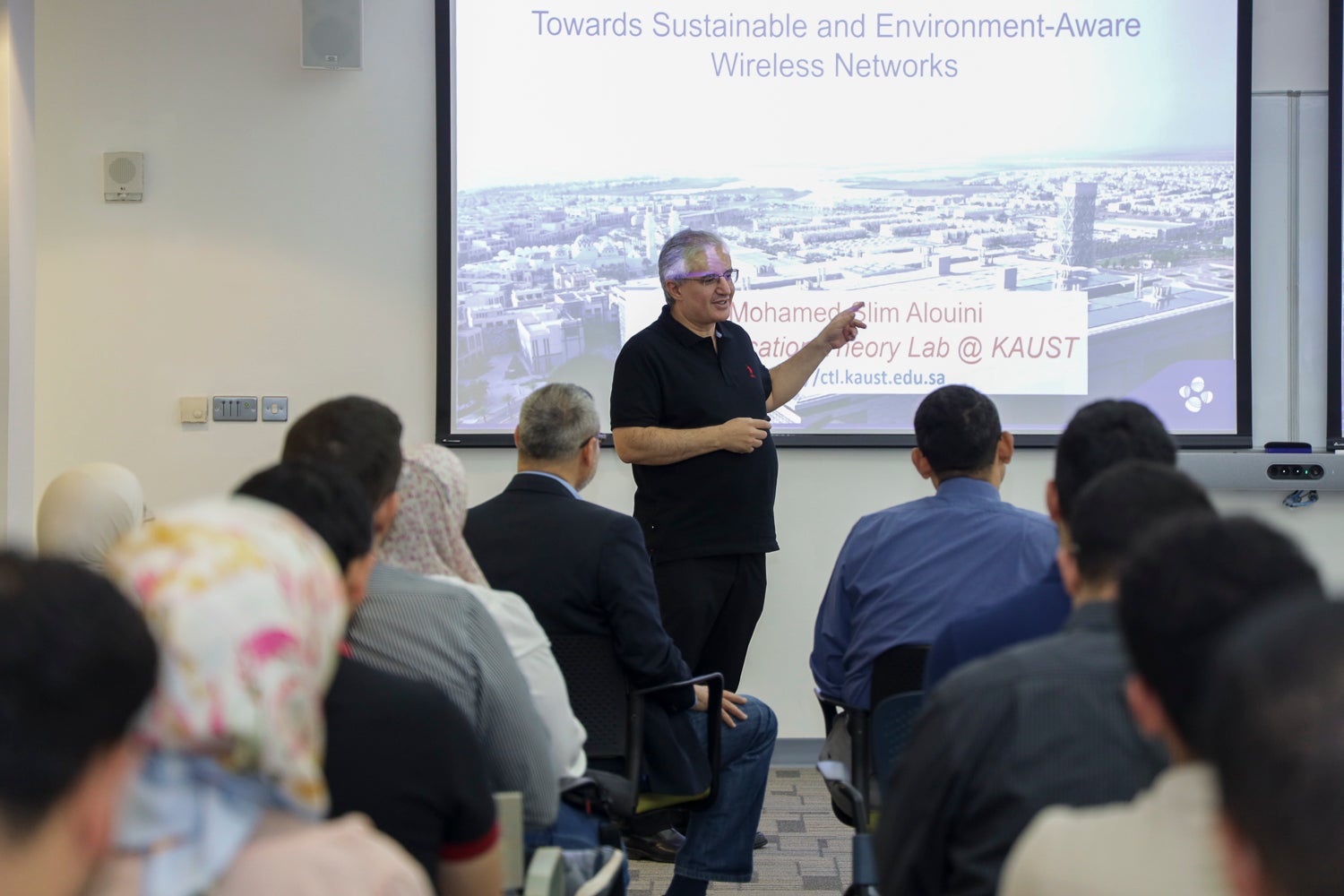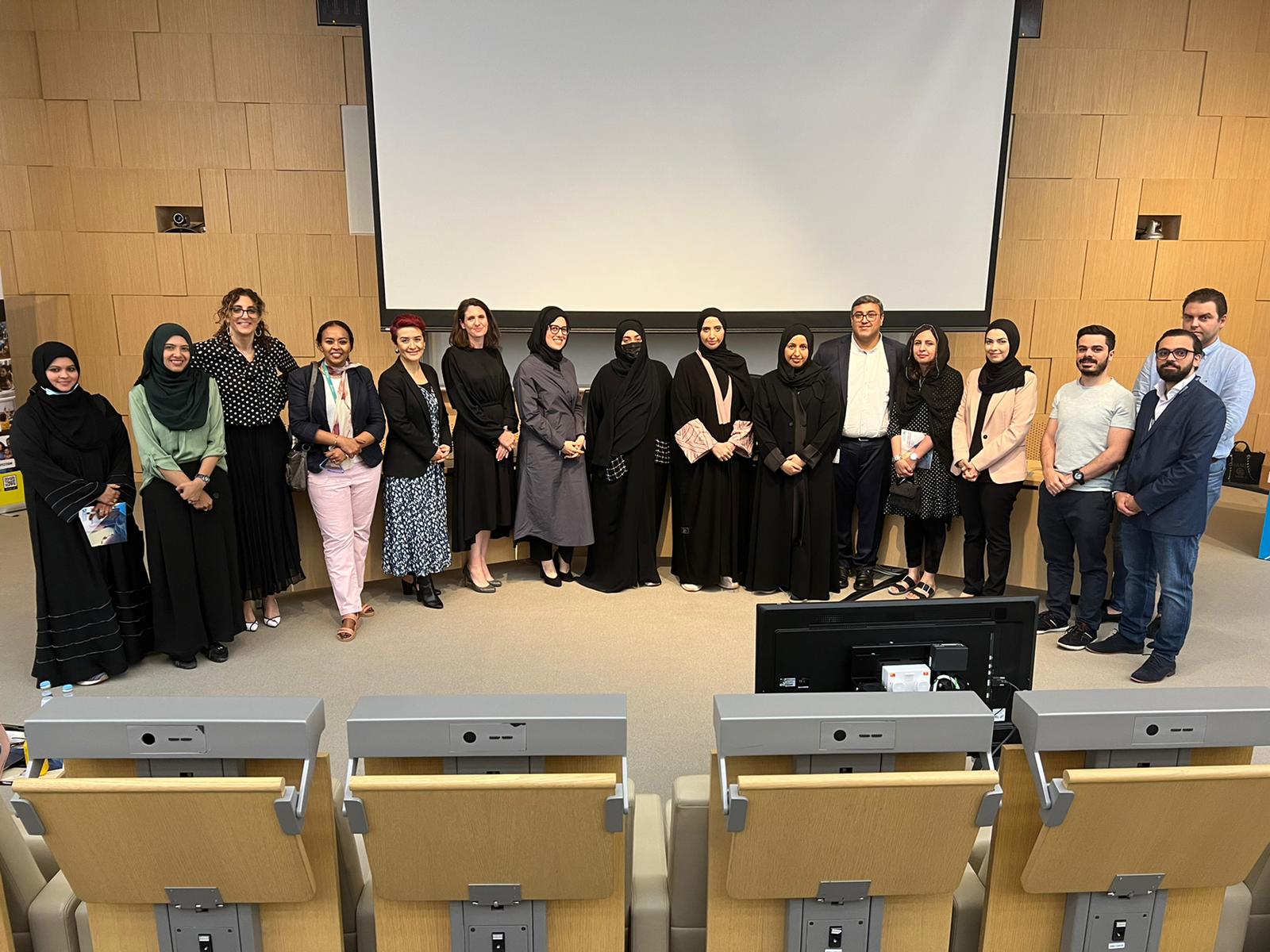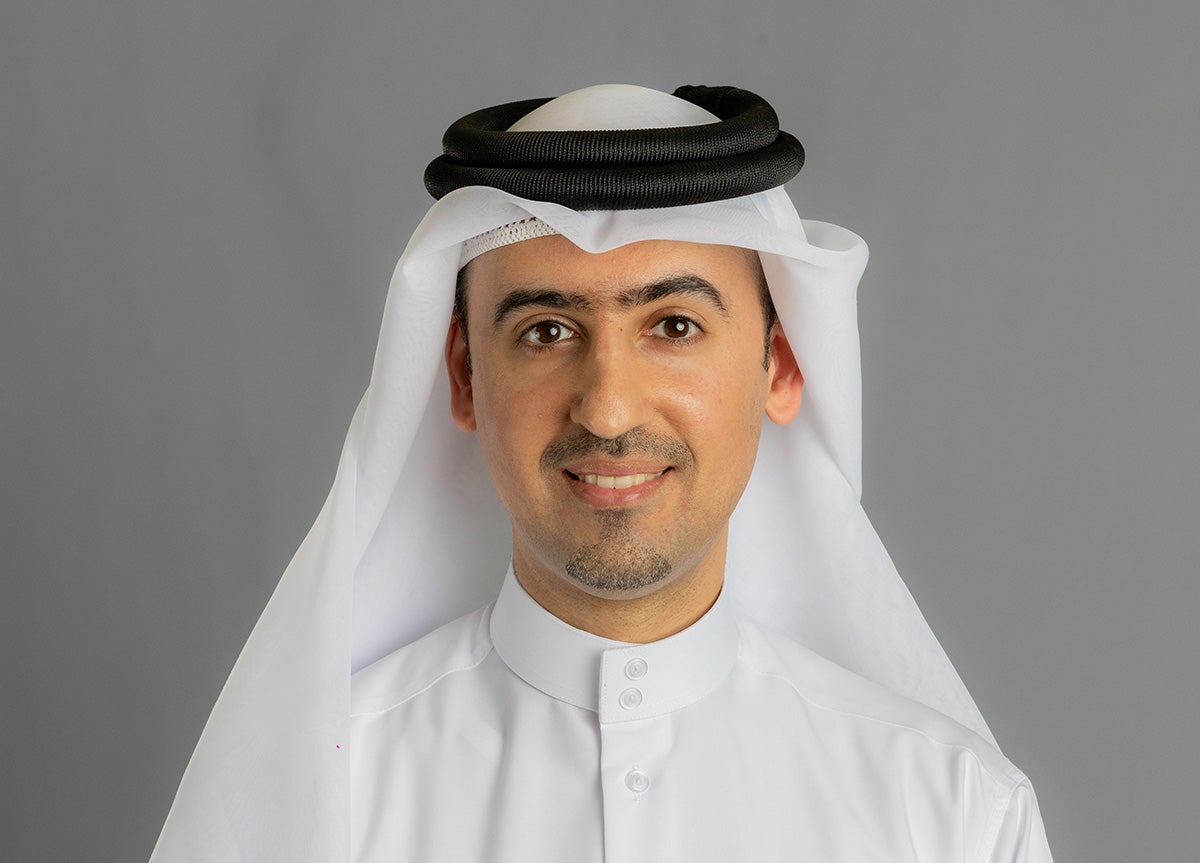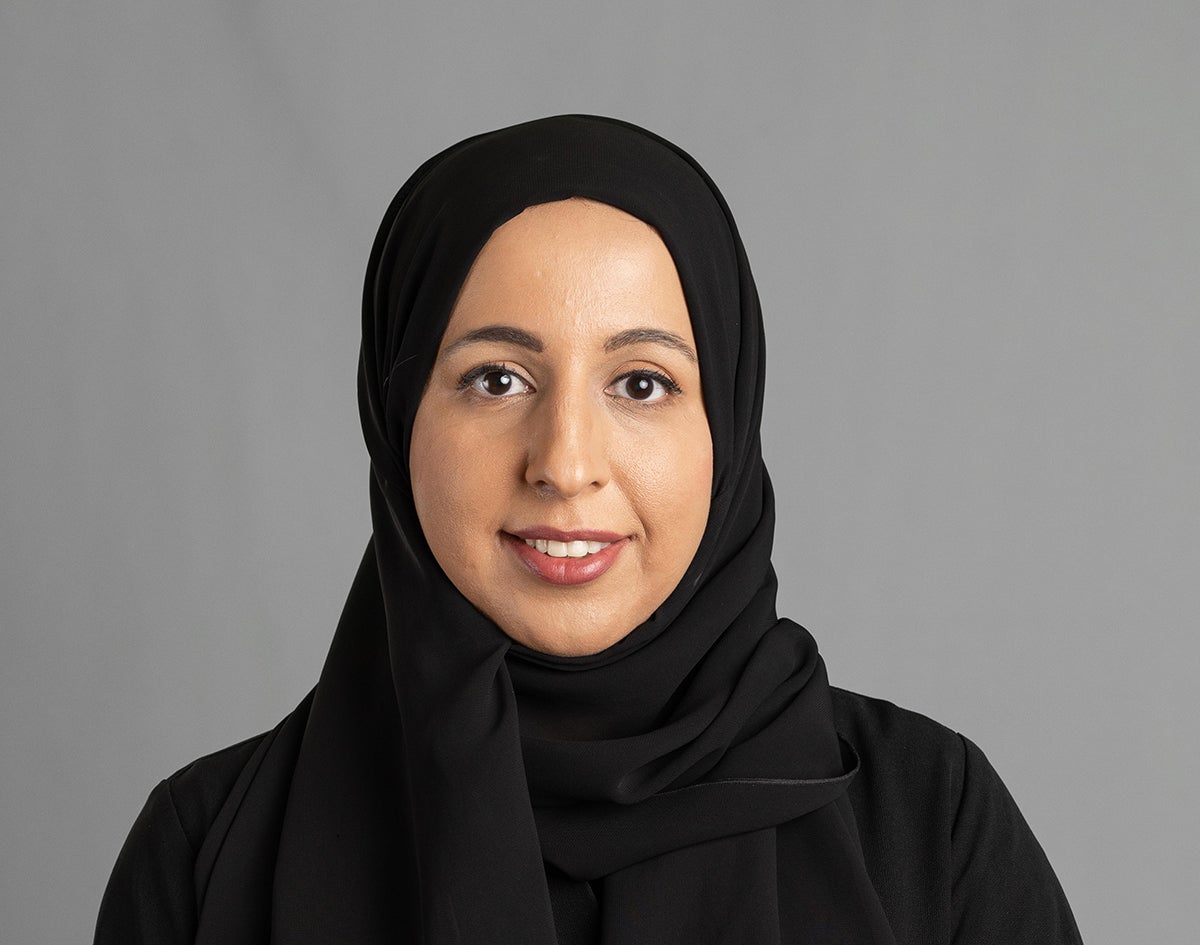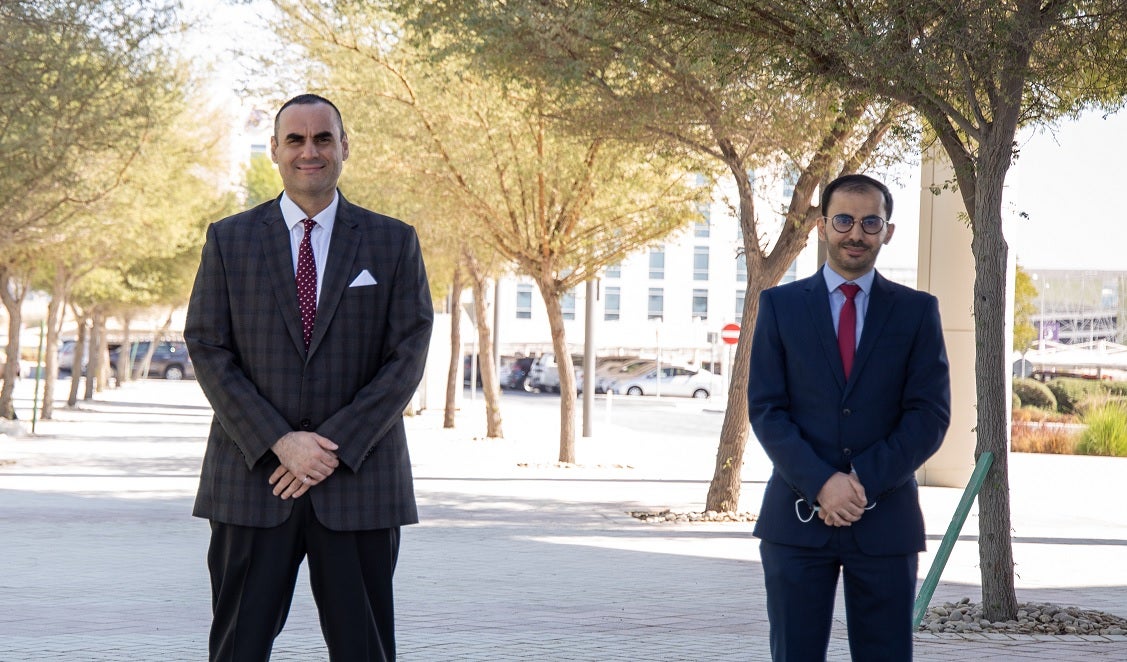
HBKU’s College of Science and Engineering Team Wins First Place in Middle East and Africa at ITU AI4Dev Challenge
ITU partners with UN agencies and the WHO on global innovation challenge
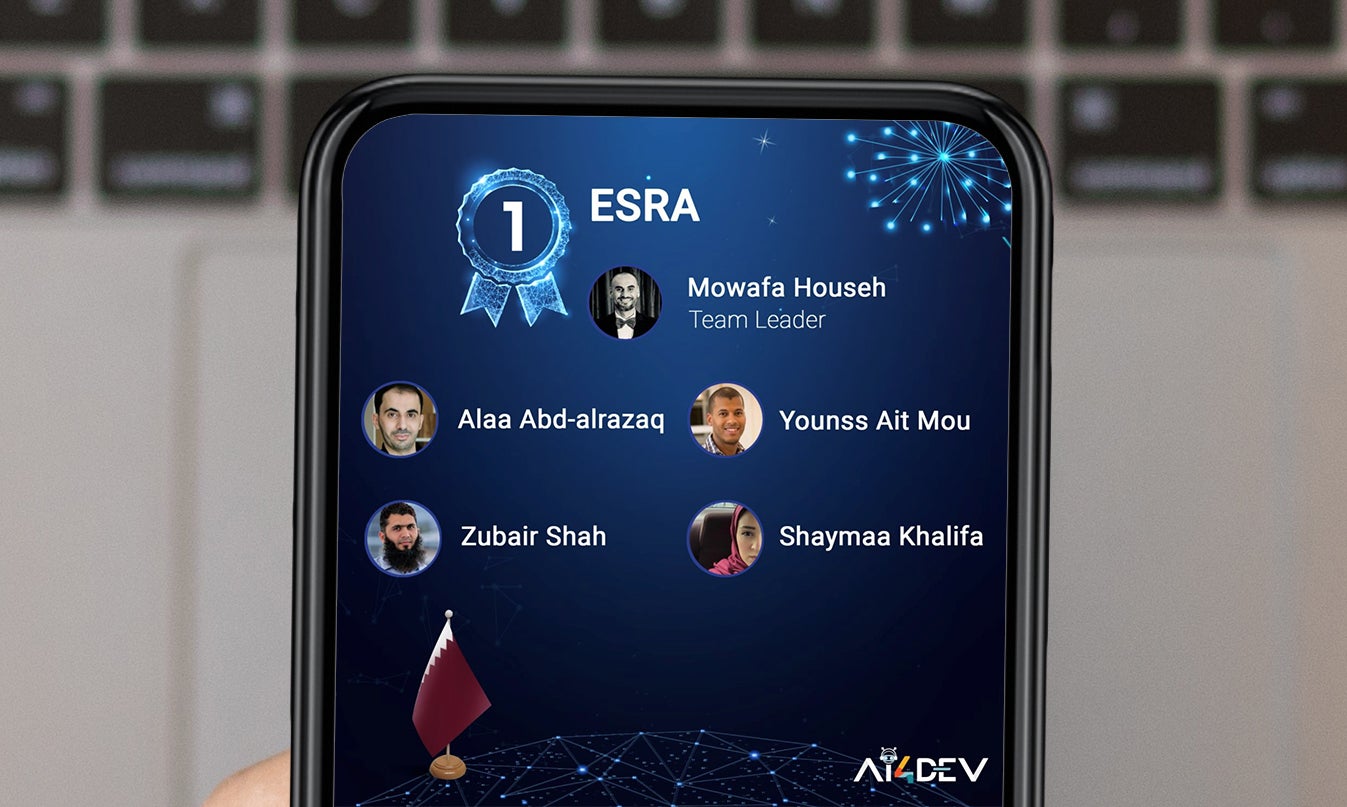
The College of Science and Engineering (CSE) at Hamad Bin Khalifa University (HBKU) recently highlighted the significant positive impact of their work in the field of artificial intelligence when a team led by Dr. Mowafa Househ, associate professor at CSE, won first place in the Middle East and Africa at the AI for Development (AI4Dev) Challenge for the ESRA Application.
Dr. Househ’s team from CSE included Dr. Alaa Abd-alrazaq, post-doc; Dr. Zubair Shah, assistant professor; Dr. Younns Ait Mou, software engineer and research fellow; and Shaymaa Khalifa, software engineer. The CSE team began developing the Emotion Sensing Recognition App (ESRA) to help address the potential negative impact of the COVID-19 pandemic on the mental health of families, especially children. The algorithm was built with the help of an art therapist and AI technology. ESRA provides feedback on a child’s emotional state and well-being to parents, teachers and mental health practitioners based on an analysis of their drawings. The app saves the well-being responses to enable the emotional status of the child to be tracked over time. ESRA can be used as a tool to monitor a number of mental health conditions while also encouraging family bonding.
The AI4Dev Challenge was launched by the International Telecommunications Union (ITU) to identify innovative and impactful Artificial Intelligence (AI) solutions that would help achieve four Sustainable Development Goals (SDGs) in Arab and African states. The competition was coordinated by the Nile Pioneers initiative and held in partnership with the United Nations Development Programme (UNDP), the World Health Organization (WHO), United Nations Educational, Scientific and Cultural Organization (UNESCO), Nile University, Egypt, and other local and international organizations.
The challenge attracted over 200 entrants, with participants from 17 countries and 25 different nationalities. Along with cash prizes for the top four teams, the winners will receive mentorship, training, and guidance on developing prototypes, in keeping with the initiative’s aim to build the capacity of new innovators in emerging technologies and support their entry into the market, while encouraging new partnerships, collaboration, and cooperation.
The competition’s jury selected ESRA as a winner of the challenge based on six core criteria, which included problem relevance, solution urgency, solution scalability, team requirements, use of AI, and data acquisition.
Dr. Househ said: “Our participation in the AI4Dev Challenge highlighted our aim at CSE to serve societal needs and the recognition of our ESRA app is very encouraging. In particular, the tool recognizes the impact on children and adolescents in times when access to traditional mental health consultation is missing. Not only does this award encourage us as researchers to see our work having an impact on driving sustainable development across the region, but it also highlights the real-world application of AI, which is ultimately an important goal of our research work at HBKU.”
Commenting on the success, Dr. Mounir Hamdi, founding dean at CSE, said: “This prestigious win for the ESRA tool is a tremendous and noteworthy achievement by the team at the global level. It is a testament to the significance of CSE’s research and world standing in providing novel solutions to the UN SDGs and the exceptional opportunities we provide for impactful research that advances development needs.”
The ITU quotes Chaesub Lee, Director, ITU Telecommunication Standardization Bureau, as having said: “The ITU Challenge provided a platform for participants to apply ITU’s Machine Learning Toolkit in solving practical problem statements. The ITU Challenge allowed participants to connect with new partners in the ITU community — and new tools and data resources — to achieve goals set out by problem statements contributed by industry and academia.”
For more information on the work of the College of Science and Engineering, please visit cse.hbku.edu.qa
Related News
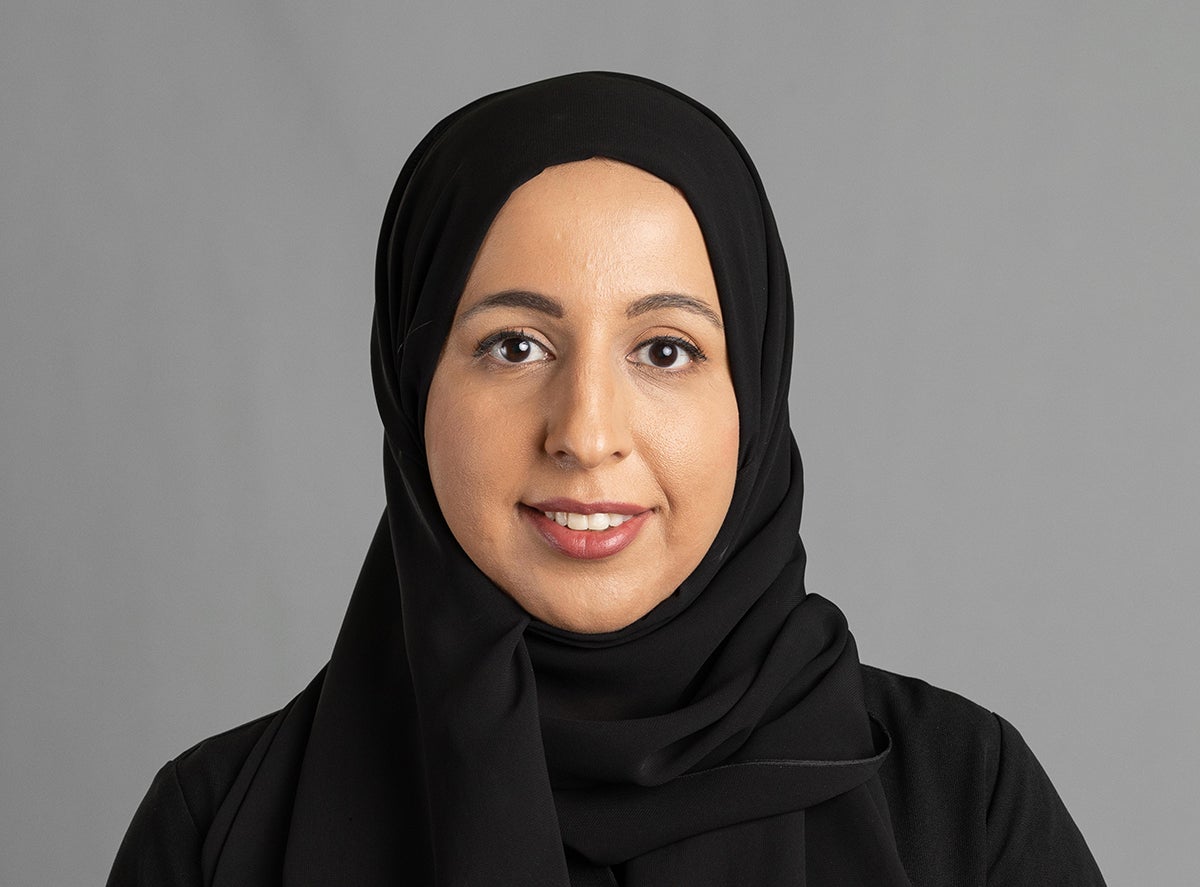
College of Science and Engineering Highlights Research on Digital Trends at International Conference on Persuasive Technologies

College of Science and Engineering Signs MoU with Hassad Food to Advance Science and Technology in Food Production
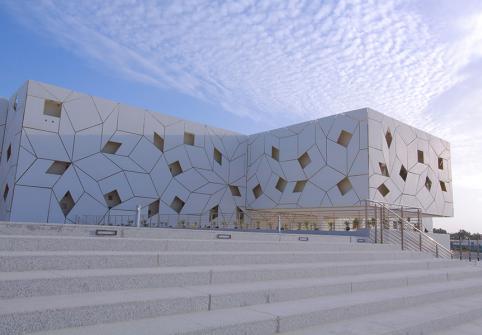
College of Science and Engineering Awarded Grant to Create a National Risk Management Plan for Qatar
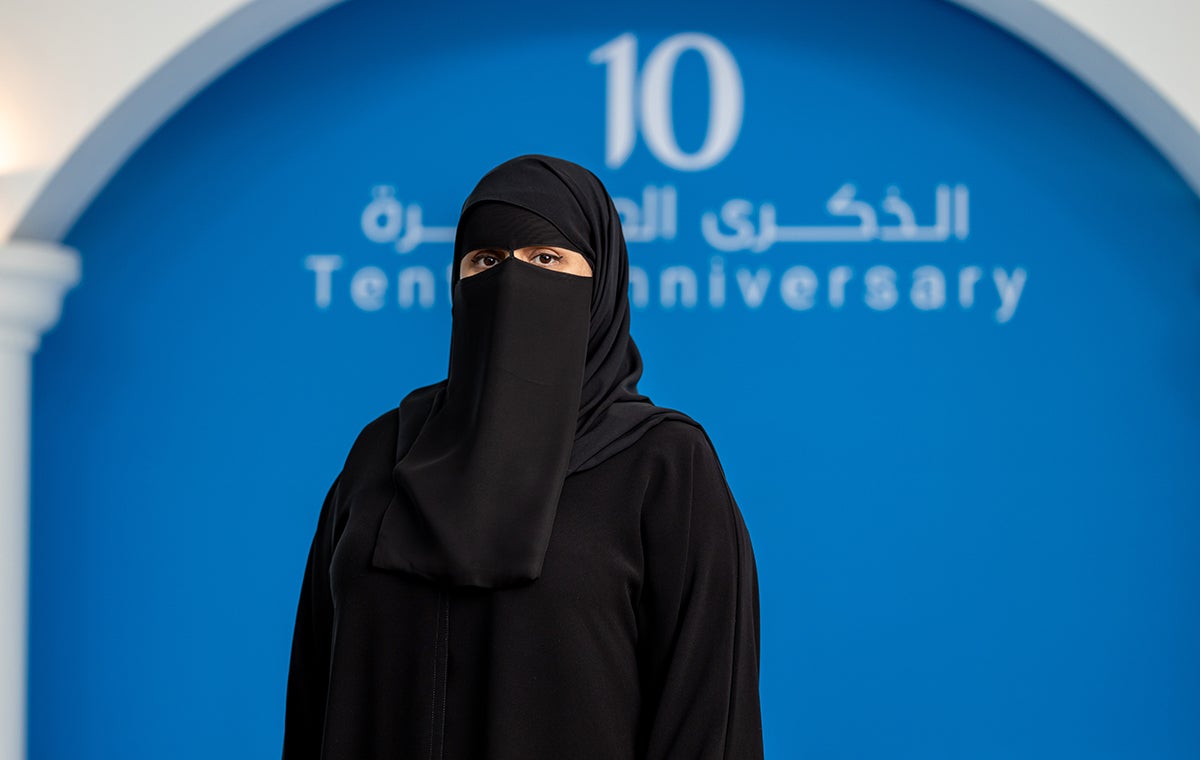
Interview with Muneera Al-Qahtani, Graduate, College of Science and Engineering, First Batch of HBKU Graduates
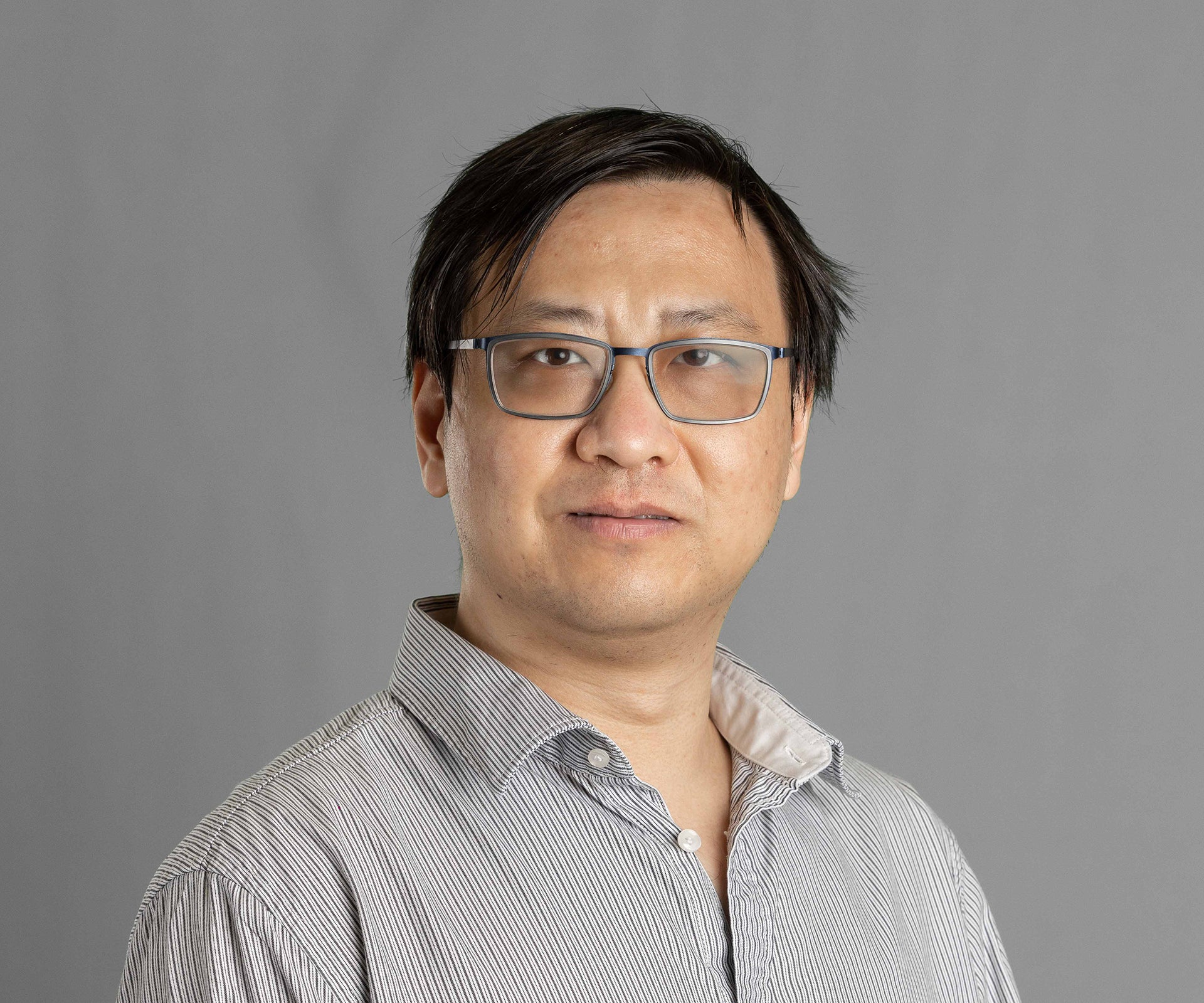
CSE Wins Best Research Paper Award at 47th International Conference on Very Large Databases

College of Science and Engineering Highlights Research on Digital Trends at International Conference on Persuasive Technologies

College of Science and Engineering Signs MoU with Hassad Food to Advance Science and Technology in Food Production

College of Science and Engineering Awarded Grant to Create a National Risk Management Plan for Qatar

Interview with Muneera Al-Qahtani, Graduate, College of Science and Engineering, First Batch of HBKU Graduates

CSE Wins Best Research Paper Award at 47th International Conference on Very Large Databases

College of Science and Engineering Highlights Research on Digital Trends at International Conference on Persuasive Technologies

College of Science and Engineering Signs MoU with Hassad Food to Advance Science and Technology in Food Production

College of Science and Engineering Awarded Grant to Create a National Risk Management Plan for Qatar

Interview with Muneera Al-Qahtani, Graduate, College of Science and Engineering, First Batch of HBKU Graduates

CSE Wins Best Research Paper Award at 47th International Conference on Very Large Databases

College of Science and Engineering Highlights Research on Digital Trends at International Conference on Persuasive Technologies

College of Science and Engineering Signs MoU with Hassad Food to Advance Science and Technology in Food Production

College of Science and Engineering Awarded Grant to Create a National Risk Management Plan for Qatar

Interview with Muneera Al-Qahtani, Graduate, College of Science and Engineering, First Batch of HBKU Graduates

CSE Wins Best Research Paper Award at 47th International Conference on Very Large Databases

College of Science and Engineering Highlights Research on Digital Trends at International Conference on Persuasive Technologies

College of Science and Engineering Signs MoU with Hassad Food to Advance Science and Technology in Food Production

College of Science and Engineering Awarded Grant to Create a National Risk Management Plan for Qatar

Interview with Muneera Al-Qahtani, Graduate, College of Science and Engineering, First Batch of HBKU Graduates

CSE Wins Best Research Paper Award at 47th International Conference on Very Large Databases

College of Science and Engineering Highlights Research on Digital Trends at International Conference on Persuasive Technologies

College of Science and Engineering Signs MoU with Hassad Food to Advance Science and Technology in Food Production

College of Science and Engineering Awarded Grant to Create a National Risk Management Plan for Qatar

Interview with Muneera Al-Qahtani, Graduate, College of Science and Engineering, First Batch of HBKU Graduates

CSE Wins Best Research Paper Award at 47th International Conference on Very Large Databases

College of Science and Engineering Highlights Research on Digital Trends at International Conference on Persuasive Technologies

College of Science and Engineering Signs MoU with Hassad Food to Advance Science and Technology in Food Production

College of Science and Engineering Awarded Grant to Create a National Risk Management Plan for Qatar

Interview with Muneera Al-Qahtani, Graduate, College of Science and Engineering, First Batch of HBKU Graduates

CSE Wins Best Research Paper Award at 47th International Conference on Very Large Databases

College of Science and Engineering Highlights Research on Digital Trends at International Conference on Persuasive Technologies

College of Science and Engineering Signs MoU with Hassad Food to Advance Science and Technology in Food Production

College of Science and Engineering Awarded Grant to Create a National Risk Management Plan for Qatar

Interview with Muneera Al-Qahtani, Graduate, College of Science and Engineering, First Batch of HBKU Graduates

CSE Wins Best Research Paper Award at 47th International Conference on Very Large Databases

College of Science and Engineering Highlights Research on Digital Trends at International Conference on Persuasive Technologies

College of Science and Engineering Signs MoU with Hassad Food to Advance Science and Technology in Food Production

College of Science and Engineering Awarded Grant to Create a National Risk Management Plan for Qatar

Interview with Muneera Al-Qahtani, Graduate, College of Science and Engineering, First Batch of HBKU Graduates

CSE Wins Best Research Paper Award at 47th International Conference on Very Large Databases

College of Science and Engineering Highlights Research on Digital Trends at International Conference on Persuasive Technologies

College of Science and Engineering Signs MoU with Hassad Food to Advance Science and Technology in Food Production

College of Science and Engineering Awarded Grant to Create a National Risk Management Plan for Qatar

Interview with Muneera Al-Qahtani, Graduate, College of Science and Engineering, First Batch of HBKU Graduates

CSE Wins Best Research Paper Award at 47th International Conference on Very Large Databases

College of Science and Engineering Highlights Research on Digital Trends at International Conference on Persuasive Technologies

College of Science and Engineering Signs MoU with Hassad Food to Advance Science and Technology in Food Production

College of Science and Engineering Awarded Grant to Create a National Risk Management Plan for Qatar

Interview with Muneera Al-Qahtani, Graduate, College of Science and Engineering, First Batch of HBKU Graduates

CSE Wins Best Research Paper Award at 47th International Conference on Very Large Databases

College of Science and Engineering Highlights Research on Digital Trends at International Conference on Persuasive Technologies

College of Science and Engineering Signs MoU with Hassad Food to Advance Science and Technology in Food Production

College of Science and Engineering Awarded Grant to Create a National Risk Management Plan for Qatar

Interview with Muneera Al-Qahtani, Graduate, College of Science and Engineering, First Batch of HBKU Graduates

CSE Wins Best Research Paper Award at 47th International Conference on Very Large Databases

College of Science and Engineering Highlights Research on Digital Trends at International Conference on Persuasive Technologies

College of Science and Engineering Signs MoU with Hassad Food to Advance Science and Technology in Food Production

College of Science and Engineering Awarded Grant to Create a National Risk Management Plan for Qatar

Interview with Muneera Al-Qahtani, Graduate, College of Science and Engineering, First Batch of HBKU Graduates

CSE Wins Best Research Paper Award at 47th International Conference on Very Large Databases

College of Science and Engineering Highlights Research on Digital Trends at International Conference on Persuasive Technologies

College of Science and Engineering Signs MoU with Hassad Food to Advance Science and Technology in Food Production

College of Science and Engineering Awarded Grant to Create a National Risk Management Plan for Qatar

Interview with Muneera Al-Qahtani, Graduate, College of Science and Engineering, First Batch of HBKU Graduates

CSE Wins Best Research Paper Award at 47th International Conference on Very Large Databases

College of Science and Engineering Highlights Research on Digital Trends at International Conference on Persuasive Technologies

College of Science and Engineering Signs MoU with Hassad Food to Advance Science and Technology in Food Production

College of Science and Engineering Awarded Grant to Create a National Risk Management Plan for Qatar

Interview with Muneera Al-Qahtani, Graduate, College of Science and Engineering, First Batch of HBKU Graduates

CSE Wins Best Research Paper Award at 47th International Conference on Very Large Databases

College of Science and Engineering Highlights Research on Digital Trends at International Conference on Persuasive Technologies

College of Science and Engineering Signs MoU with Hassad Food to Advance Science and Technology in Food Production

College of Science and Engineering Awarded Grant to Create a National Risk Management Plan for Qatar

Interview with Muneera Al-Qahtani, Graduate, College of Science and Engineering, First Batch of HBKU Graduates

CSE Wins Best Research Paper Award at 47th International Conference on Very Large Databases

College of Science and Engineering Highlights Research on Digital Trends at International Conference on Persuasive Technologies

College of Science and Engineering Signs MoU with Hassad Food to Advance Science and Technology in Food Production

College of Science and Engineering Awarded Grant to Create a National Risk Management Plan for Qatar

Interview with Muneera Al-Qahtani, Graduate, College of Science and Engineering, First Batch of HBKU Graduates

CSE Wins Best Research Paper Award at 47th International Conference on Very Large Databases

College of Science and Engineering Highlights Research on Digital Trends at International Conference on Persuasive Technologies

College of Science and Engineering Signs MoU with Hassad Food to Advance Science and Technology in Food Production

College of Science and Engineering Awarded Grant to Create a National Risk Management Plan for Qatar

Interview with Muneera Al-Qahtani, Graduate, College of Science and Engineering, First Batch of HBKU Graduates

CSE Wins Best Research Paper Award at 47th International Conference on Very Large Databases

College of Science and Engineering Highlights Research on Digital Trends at International Conference on Persuasive Technologies

College of Science and Engineering Signs MoU with Hassad Food to Advance Science and Technology in Food Production

College of Science and Engineering Awarded Grant to Create a National Risk Management Plan for Qatar

Interview with Muneera Al-Qahtani, Graduate, College of Science and Engineering, First Batch of HBKU Graduates

CSE Wins Best Research Paper Award at 47th International Conference on Very Large Databases

College of Science and Engineering Highlights Research on Digital Trends at International Conference on Persuasive Technologies

College of Science and Engineering Signs MoU with Hassad Food to Advance Science and Technology in Food Production

College of Science and Engineering Awarded Grant to Create a National Risk Management Plan for Qatar

Interview with Muneera Al-Qahtani, Graduate, College of Science and Engineering, First Batch of HBKU Graduates

CSE Wins Best Research Paper Award at 47th International Conference on Very Large Databases

College of Science and Engineering Highlights Research on Digital Trends at International Conference on Persuasive Technologies

College of Science and Engineering Signs MoU with Hassad Food to Advance Science and Technology in Food Production

College of Science and Engineering Awarded Grant to Create a National Risk Management Plan for Qatar

Interview with Muneera Al-Qahtani, Graduate, College of Science and Engineering, First Batch of HBKU Graduates

CSE Wins Best Research Paper Award at 47th International Conference on Very Large Databases

College of Science and Engineering Highlights Research on Digital Trends at International Conference on Persuasive Technologies

College of Science and Engineering Signs MoU with Hassad Food to Advance Science and Technology in Food Production

College of Science and Engineering Awarded Grant to Create a National Risk Management Plan for Qatar

Interview with Muneera Al-Qahtani, Graduate, College of Science and Engineering, First Batch of HBKU Graduates

CSE Wins Best Research Paper Award at 47th International Conference on Very Large Databases

College of Science and Engineering Highlights Research on Digital Trends at International Conference on Persuasive Technologies

College of Science and Engineering Signs MoU with Hassad Food to Advance Science and Technology in Food Production

College of Science and Engineering Awarded Grant to Create a National Risk Management Plan for Qatar

Interview with Muneera Al-Qahtani, Graduate, College of Science and Engineering, First Batch of HBKU Graduates

CSE Wins Best Research Paper Award at 47th International Conference on Very Large Databases

College of Science and Engineering Highlights Research on Digital Trends at International Conference on Persuasive Technologies

College of Science and Engineering Signs MoU with Hassad Food to Advance Science and Technology in Food Production

College of Science and Engineering Awarded Grant to Create a National Risk Management Plan for Qatar

Interview with Muneera Al-Qahtani, Graduate, College of Science and Engineering, First Batch of HBKU Graduates

CSE Wins Best Research Paper Award at 47th International Conference on Very Large Databases

College of Science and Engineering Highlights Research on Digital Trends at International Conference on Persuasive Technologies

College of Science and Engineering Signs MoU with Hassad Food to Advance Science and Technology in Food Production

College of Science and Engineering Awarded Grant to Create a National Risk Management Plan for Qatar

Interview with Muneera Al-Qahtani, Graduate, College of Science and Engineering, First Batch of HBKU Graduates

CSE Wins Best Research Paper Award at 47th International Conference on Very Large Databases

College of Science and Engineering Highlights Research on Digital Trends at International Conference on Persuasive Technologies

College of Science and Engineering Signs MoU with Hassad Food to Advance Science and Technology in Food Production

College of Science and Engineering Awarded Grant to Create a National Risk Management Plan for Qatar

Interview with Muneera Al-Qahtani, Graduate, College of Science and Engineering, First Batch of HBKU Graduates

CSE Wins Best Research Paper Award at 47th International Conference on Very Large Databases

College of Science and Engineering Highlights Research on Digital Trends at International Conference on Persuasive Technologies

College of Science and Engineering Signs MoU with Hassad Food to Advance Science and Technology in Food Production

College of Science and Engineering Awarded Grant to Create a National Risk Management Plan for Qatar

Interview with Muneera Al-Qahtani, Graduate, College of Science and Engineering, First Batch of HBKU Graduates

CSE Wins Best Research Paper Award at 47th International Conference on Very Large Databases

College of Science and Engineering Highlights Research on Digital Trends at International Conference on Persuasive Technologies

College of Science and Engineering Signs MoU with Hassad Food to Advance Science and Technology in Food Production

College of Science and Engineering Awarded Grant to Create a National Risk Management Plan for Qatar

Interview with Muneera Al-Qahtani, Graduate, College of Science and Engineering, First Batch of HBKU Graduates

CSE Wins Best Research Paper Award at 47th International Conference on Very Large Databases

College of Science and Engineering Highlights Research on Digital Trends at International Conference on Persuasive Technologies

College of Science and Engineering Signs MoU with Hassad Food to Advance Science and Technology in Food Production

College of Science and Engineering Awarded Grant to Create a National Risk Management Plan for Qatar

Interview with Muneera Al-Qahtani, Graduate, College of Science and Engineering, First Batch of HBKU Graduates

CSE Wins Best Research Paper Award at 47th International Conference on Very Large Databases

College of Science and Engineering Highlights Research on Digital Trends at International Conference on Persuasive Technologies

College of Science and Engineering Signs MoU with Hassad Food to Advance Science and Technology in Food Production

College of Science and Engineering Awarded Grant to Create a National Risk Management Plan for Qatar

Interview with Muneera Al-Qahtani, Graduate, College of Science and Engineering, First Batch of HBKU Graduates

CSE Wins Best Research Paper Award at 47th International Conference on Very Large Databases

College of Science and Engineering Highlights Research on Digital Trends at International Conference on Persuasive Technologies

College of Science and Engineering Signs MoU with Hassad Food to Advance Science and Technology in Food Production

College of Science and Engineering Awarded Grant to Create a National Risk Management Plan for Qatar

Interview with Muneera Al-Qahtani, Graduate, College of Science and Engineering, First Batch of HBKU Graduates

CSE Wins Best Research Paper Award at 47th International Conference on Very Large Databases

College of Science and Engineering Highlights Research on Digital Trends at International Conference on Persuasive Technologies

College of Science and Engineering Signs MoU with Hassad Food to Advance Science and Technology in Food Production

College of Science and Engineering Awarded Grant to Create a National Risk Management Plan for Qatar

Interview with Muneera Al-Qahtani, Graduate, College of Science and Engineering, First Batch of HBKU Graduates

CSE Wins Best Research Paper Award at 47th International Conference on Very Large Databases

College of Science and Engineering Highlights Research on Digital Trends at International Conference on Persuasive Technologies

College of Science and Engineering Signs MoU with Hassad Food to Advance Science and Technology in Food Production

College of Science and Engineering Awarded Grant to Create a National Risk Management Plan for Qatar

Interview with Muneera Al-Qahtani, Graduate, College of Science and Engineering, First Batch of HBKU Graduates

CSE Wins Best Research Paper Award at 47th International Conference on Very Large Databases

College of Science and Engineering Highlights Research on Digital Trends at International Conference on Persuasive Technologies

College of Science and Engineering Signs MoU with Hassad Food to Advance Science and Technology in Food Production

College of Science and Engineering Awarded Grant to Create a National Risk Management Plan for Qatar

Interview with Muneera Al-Qahtani, Graduate, College of Science and Engineering, First Batch of HBKU Graduates

CSE Wins Best Research Paper Award at 47th International Conference on Very Large Databases

College of Science and Engineering Highlights Research on Digital Trends at International Conference on Persuasive Technologies

College of Science and Engineering Signs MoU with Hassad Food to Advance Science and Technology in Food Production

College of Science and Engineering Awarded Grant to Create a National Risk Management Plan for Qatar

Interview with Muneera Al-Qahtani, Graduate, College of Science and Engineering, First Batch of HBKU Graduates

CSE Wins Best Research Paper Award at 47th International Conference on Very Large Databases

College of Science and Engineering Highlights Research on Digital Trends at International Conference on Persuasive Technologies

College of Science and Engineering Signs MoU with Hassad Food to Advance Science and Technology in Food Production

College of Science and Engineering Awarded Grant to Create a National Risk Management Plan for Qatar

Interview with Muneera Al-Qahtani, Graduate, College of Science and Engineering, First Batch of HBKU Graduates

CSE Wins Best Research Paper Award at 47th International Conference on Very Large Databases

College of Science and Engineering Highlights Research on Digital Trends at International Conference on Persuasive Technologies

College of Science and Engineering Signs MoU with Hassad Food to Advance Science and Technology in Food Production

College of Science and Engineering Awarded Grant to Create a National Risk Management Plan for Qatar

Interview with Muneera Al-Qahtani, Graduate, College of Science and Engineering, First Batch of HBKU Graduates

CSE Wins Best Research Paper Award at 47th International Conference on Very Large Databases

College of Science and Engineering Highlights Research on Digital Trends at International Conference on Persuasive Technologies

College of Science and Engineering Signs MoU with Hassad Food to Advance Science and Technology in Food Production

College of Science and Engineering Awarded Grant to Create a National Risk Management Plan for Qatar

Interview with Muneera Al-Qahtani, Graduate, College of Science and Engineering, First Batch of HBKU Graduates

CSE Wins Best Research Paper Award at 47th International Conference on Very Large Databases

College of Science and Engineering Highlights Research on Digital Trends at International Conference on Persuasive Technologies

College of Science and Engineering Signs MoU with Hassad Food to Advance Science and Technology in Food Production

College of Science and Engineering Awarded Grant to Create a National Risk Management Plan for Qatar

Interview with Muneera Al-Qahtani, Graduate, College of Science and Engineering, First Batch of HBKU Graduates

CSE Wins Best Research Paper Award at 47th International Conference on Very Large Databases

College of Science and Engineering Highlights Research on Digital Trends at International Conference on Persuasive Technologies

College of Science and Engineering Signs MoU with Hassad Food to Advance Science and Technology in Food Production

College of Science and Engineering Awarded Grant to Create a National Risk Management Plan for Qatar

Interview with Muneera Al-Qahtani, Graduate, College of Science and Engineering, First Batch of HBKU Graduates

CSE Wins Best Research Paper Award at 47th International Conference on Very Large Databases

College of Science and Engineering Highlights Research on Digital Trends at International Conference on Persuasive Technologies







